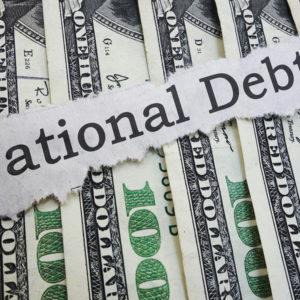In the 1930s, President Hebert Hoover was fond of saying that blessed are the children since they shall inherit the national debt. He must be rolling over in his grave today and he must be pitying our children on learning that for the first time ever our national debt has exceeded $30 trillion. In relation to the size of the economy, our public debt level now is higher than it was at the end of the Second World War.
While Hoover might have worried about a large national debt, today that does not seem to be too much of a concern to most politicians and academic economists.
Having drunk at the fount of Modern Monetary Theory and believing that interest rates will stay low forever, our politicians and academics are unfazed by record peacetime budget deficits and unprecedentedly high debt levels. In their mind, high public debt levels do not matter. It is all the more surprising considering that, as Harvard’s Kenneth Rogoff and Carmen Reinhart have reminded us, history is littered with all too many examples of countries having experienced serious economic crises as a result of their having got themselves onto unsustainable public debt paths.
The major problem with a high public debt level is that it saddles the government with large future interest payment obligations. That leaves little room for other public expenditures and makes it difficult for the government to bring the budget deficit under control. Failing to rein in the deficit, in turn, risks keeping the public debt on an ever-increasing path. In that context, it has to be of deep concern that the non-partisan Congressional Budget Office is forecasting that on present trends the country’s public debt to GDP ratio will approximately double from around 100 percent at present to 200 percent by 2050.
A high public debt level highly compromises the Federal Reserve’s ability to keep inflation under control. In particular, it makes it difficult for the Fed to raise interest rates for fear of adding to the government’s interest payment burden. Such a consideration would seem to have particular pertinence today with inflation running at its fastest pace in the past forty years and with the Fed needing to raise interest rates substantially from its present zero bound if it hopes to get the inflation genie back into the bottle.
Especially at a time of high inflation, a high public debt level makes the country economically vulnerable. That is because we have become the world’s largest debtor nation. For many years now, we have relied on the kindness of strangers in general and on the Chinese and Japanese in particular to finance our budget excesses.
If foreigners begin to perceive that we are in the process of inflating away our debt, they will be reluctant to hold that debt and will demand higher interest rates in order to compensate them for inflation risk. That in turn could cause the dollar to swoon, which would only add to inflationary pressures and fuel further concerns about our wanting to inflate away our debt.
Unfortunately, in recent years, the lack of any real constituency for disciplined budget policies has given foreigners reason to begin doubting our political willingness to honor our public debt commitments without resorting to inflation. First, in 2017 at a time of considerable domestic economic strength, the Trump administration enacted a large unfunded corporate tax cut that added substantially to our national debt. Then, in March 2021 against the advice of most economists, the Biden administration enacted a $1.9 trillion budget stimulus that contributed to our largest peacetime budget deficit on record.
If we are not to go down the well-trodden path of countries debasing their currencies to inflate away their debt, we would seem to need to take the passing of the $30 trillion mark for our public debt more seriously than today’s politicians and academics seem to be doing. More important yet, we need to fashion a bipartisan consensus for responsible budget policies.
We owe it to our children and grandchildren.

